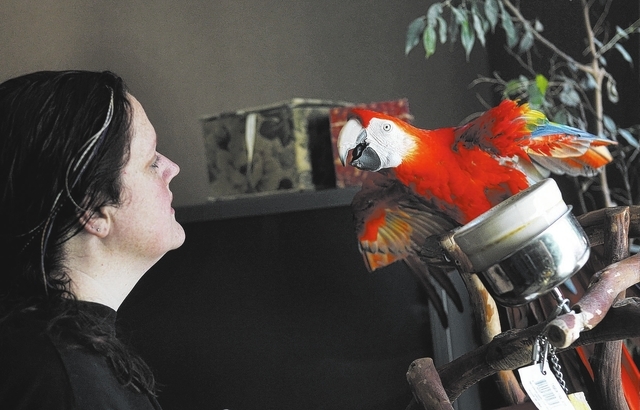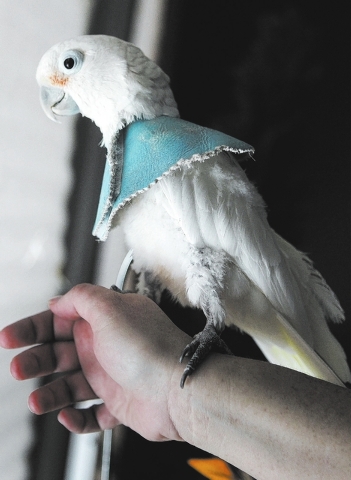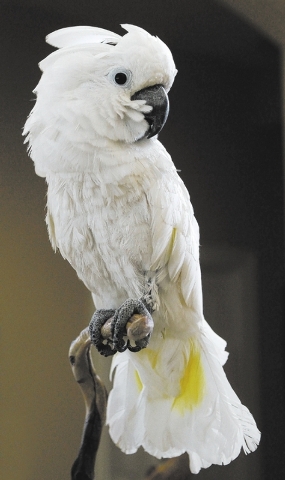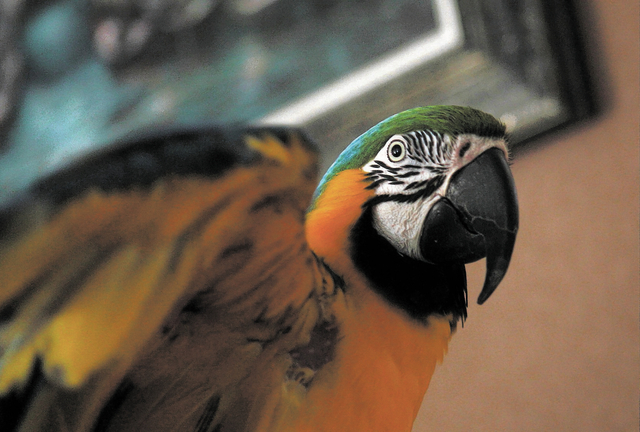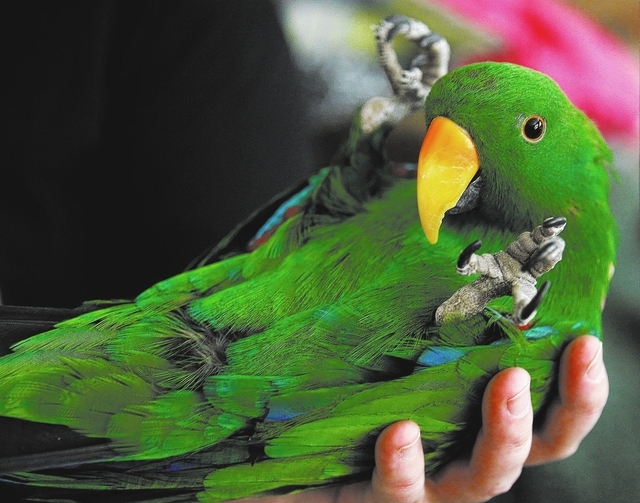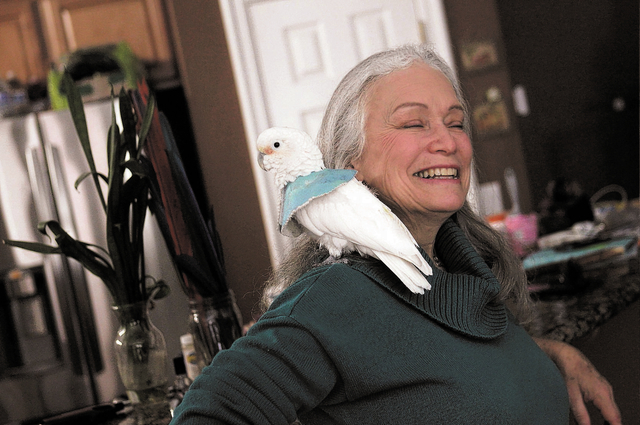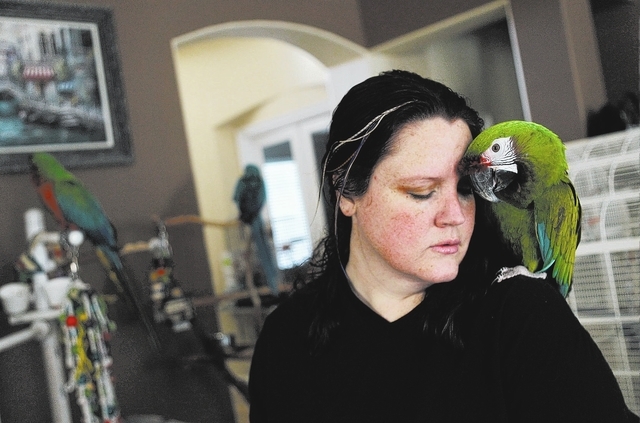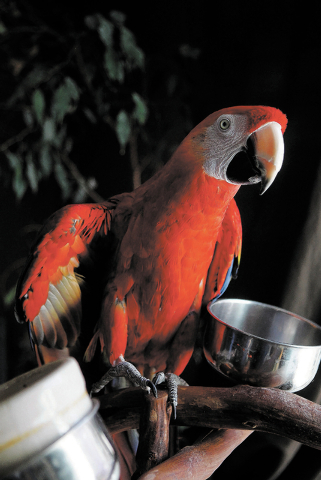Doing their part for parrots
“Marlon” is part triton cockatoo and part urban legend.
He now resides in Las Vegas and is owned by Madeleine Franco. According to numerous sources, Marlon was once owned by actor Marlon Brando. Franco knows the bird’s original breeder and his Las Vegas bird-sitter, and though she is hesitant to swear to his purported roots, she has no reason to doubt Marlon’s Brando connection.
“Many parrot breeds can live 70 or 80 years,” Franco says, “and one bird will typically have several owners in its lifetime.”
Though Franco’s Marlon is known to be a fine gentleman and a great conversationalist, parrot fanciers say a triton cockatoo named Fred was actually responsible for many other Americans ultimately owning parrots. Fred was a regular on the “Baretta” TV show. He (sometimes portrayed by a she) was affectionate, smart and often received more fan mail than series star Robert Blake.
Franco herself has been fascinated with birds for more than 35 years. She was involved in the rehabilitation of waterfowl with the U.S. Fish and Wildlife Service; she’s belonged to several bird-owner organizations. Seven years ago, she co-founded the Southern Nevada Parrot Education, Rescue & Rehoming Society, for which she serves as executive director. She and her organization’s other volunteers find new homes for parrots whose owners can no longer care for their birds.
To spread the word about their services, the group puts news on the society’s website (www.lvbirdrescue.org), and places ads on craigslist. Also volunteers such as Kelle Coble and Skye Marsh spend occasional days walking malls and street fairs, each with a parrot on her shoulder. They answer questions from curious onlookers and distribute organization business cards.
After the December holidays, Coble and Marsh also took their volunteering efforts to local grocery stores asking for donations of leftover nuts to feed the birds at the Gilcrease Nature Sanctuary in Las Vegas. Gilcrease is a custodial rescue site for birds and other animals, and the nuts help the birds cope with the colder weather. Four local stores responded with donations. Most days, however, Coble, Marsh and the other parrot society volunteers are working not for the sanctuary, but on finding new homes and appropriate cages for unwanted birds.
“Parrots are wonderful pets,” Franco says. “They are loving, intelligent and great companions if they are properly trained.”
“My birds make me laugh every morning when I see them,” Marsh adds. “Who doesn’t want to be greeted by, ‘Hey baby!’?”
“Is there anything better than having a bird put its head on your chest?” Coble asks.
So what’s the problem?
Franco says that parrots sometimes are owned by people who get a bird when it is young, adorable and making a purring sound.
“They spoil the bird terribly and keep spoiling it, creating an adult bird that is perpetually demanding and as an adult can be quite noisy. Eventually the owners decide the bird no longer has a place in the family.
“Because of the long lifetimes of many parrots,” Franco continues, “birds can outlive even loving owners, and must be surrendered. During the recession, some families that once lived in houses are now living in apartments, and because parrots aren’t always silent, having a common wall just does not work with having a large bird.”
In short, people who are interested in having a beautiful bird as a pet need the right environment and need to know that joy and a good deal of work are ahead.
The common comparison is that owning a parrot is like having a perpetual 3-year-old. Marsh says fostering a bird for a month or so is a good way to learn whether owning a parrot is a good move.
When a bird comes to the parrot society, Marsh says, the first stop is to take it to a vet for a health and a DNA check. The DNA check is often to determine the bird’s sex because for many parrot species, the difference isn’t obvious. If the bird is healthy, it goes to a foster family — sometimes for retraining.
“I’m currently fostering a bird that never learned to interact with people,” Franco notes. “I figure it will take about three months of training to make the bird ready for adoption.”
If a bird is adopted, the fee is generally twice what the veterinarian charged for the checkup plus cage expenses. That way, money is available when the next bird comes in for rescue. Franco estimates the adoption cost is typically between $200 and $400, far less than the cost of buying a bird from a breeder.
People surrendering birds are also encouraged to make a donation to the tax-exempt group. The most common species taken in by the society are cockatoos and large macaws, but all parrot breeds (and there are hundreds of them) are welcome. The organization takes in cockatiels on a case-by-case basis, and usually only if an adoptive home is immediately available.
As with many rescue organizations, home visits are a requirement before surrendering a bird to a new home. Franco says owners of birds should be even tempered and reasonably well-organized because birds do not like chaos, preferring a routine. She warns that extremely fastidious homeowners might not appreciate the “accidents” that occasionally come with owning a pet, any pet, including a bird. Birds can be house-trained, Franco says, but when outside a cage, they don’t always follow the rules.
“I tell all the foster and adoptive families I meet to call me any time,” Marsh says, “day or night, even if they think they have a dumb question. Nobody teaches you how to live with a 3-year-old, but we’ve been there. Our volunteers are always available to help.”
Franco says pet stores have often helped the parrot society by inviting the group to talk with customers about their organization.
“Typically, pet stores are not selling the larger birds,” Franco says. “But in any case, we preach that purchasing a bird should never be an impulse buy.”
In July, Franco got a call about 30 birds in one household. A man who owned 50 birds was leaving Las Vegas for the East Coast and suddenly realized that his vehicle would not accommodate all his birds. Franco and her volunteers removed 23 birds one day and seven the second day, and ultimately found foster homes for all of them.
“For many people who are responsible bird owners, the fact that they must give up a bird, a member of their family, is heart-wrenching,” Franco says. “We understand what they are going through. Any of us who have owned birds and for one reason or another have lost a bird — know it truly leaves a hole in your heart.”
The cost of feeding a parrot, Franco estimates, is between $25 and $30 a month. Marsh takes her own birds to the vet yearly. One of her birds who gets extra hard to handle during breeding season even gets a shot that dampens the effects of breeding season hormones. (Birds generally cannot be spayed or neutered, and both parrot sexes can get extra vocal during breeding season.)
Do parrots bite?
“Yes, sometimes” Marsh says, holding up an arm with a couple of red spots. “Birds have a mind of their own, and if they are saying no and you aren’t listening, you may get a nip.”
Yes, parrots can also learn words and mimic voices.
Franco recalls one woman who turned in a bird because, though she loved the bird, after her husband died, the bird would consistently say “hello” in her husband’s voice. Hearing that voice was just too disturbing, the widow explained.
Marsh notes that one of her birds, Rusty, had a cage in the hallway. When her husband arrived home from work every night, he’d first say hello to Rusty. One day, Marsh moved Rusty’s cage because she had taken in a new bird. Her husband came in the door, looked around, and Rusty cried, “I’m over here!”
All About Birds
For more information on the Southern Nevada Parrot Education, Rescue & Rehoming Society, call (702) 856-3300 or visit www.lvbirdrescue.org.



